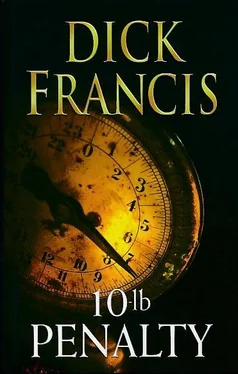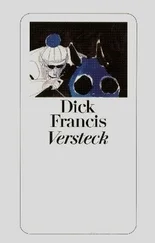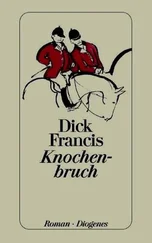Dick Francis - 10 lb Penalty
Здесь есть возможность читать онлайн «Dick Francis - 10 lb Penalty» весь текст электронной книги совершенно бесплатно (целиком полную версию без сокращений). В некоторых случаях можно слушать аудио, скачать через торрент в формате fb2 и присутствует краткое содержание. Город: London, Год выпуска: 1997, ISBN: 1997, Издательство: Michael Joseph, Жанр: Триллер, на английском языке. Описание произведения, (предисловие) а так же отзывы посетителей доступны на портале библиотеки ЛибКат.
- Название:10 lb Penalty
- Автор:
- Издательство:Michael Joseph
- Жанр:
- Год:1997
- Город:London
- ISBN:978-0-7181-4245-2
- Рейтинг книги:3 / 5. Голосов: 1
-
Избранное:Добавить в избранное
- Отзывы:
-
Ваша оценка:
- 60
- 1
- 2
- 3
- 4
- 5
10 lb Penalty: краткое содержание, описание и аннотация
Предлагаем к чтению аннотацию, описание, краткое содержание или предисловие (зависит от того, что написал сам автор книги «10 lb Penalty»). Если вы не нашли необходимую информацию о книге — напишите в комментариях, мы постараемся отыскать её.
10 lb Penalty — читать онлайн бесплатно полную книгу (весь текст) целиком
Ниже представлен текст книги, разбитый по страницам. Система сохранения места последней прочитанной страницы, позволяет с удобством читать онлайн бесплатно книгу «10 lb Penalty», без необходимости каждый раз заново искать на чём Вы остановились. Поставьте закладку, и сможете в любой момент перейти на страницу, на которой закончили чтение.
Интервал:
Закладка:
I asked him, “Did you yourself ever actually see Benedict Juliard sniffing glue, or cocaine, or anything else?”
“Had it on good authority,” he said.
Five years too late I asked him, “Whose authority?”
“Eh? What? Whose authority? Mine, of course.”
I tried again. “Did anyone tell you that Benedict Juliard was addicted to drugs? If anyone told you, who was it?”
The intelligence that had once inhabited the Durridge brain, the worldly experience that had illuminated for so long the racing scene, the grandeur of thought and judgment, all had been wiped out by a devastating hemorrhage in some tiny recess of that splendid personality. Sir Vivian Durridge no longer existed. I spoke to the shell, the chaos. There was no hope that he would ever again remember anything in detail, but he would be forever open to suggestion.
I sat with him for a while, as it seemed he liked company and, even if he didn’t know who I was, he didn’t want me to go.
The nurses said, “It settles him to have people near him. He was a great man once, you know. And you’re the second person, outside his family, who has been to see him recently. He is so pleased to have visitors.”
“Who else came?” I asked.
“Such a nice young man. Red hair. Freckles. So friendly, just like you. A journalist, he said. He was asking Sir Vivian about someone called Benedict Juliard, who had ridden his horses for him once. Oh, my goodness,” the nurses said, clapping hands to surprised mouths. “Benedict Juliard... isn’t that who you said you were?”
“That’s right. What would Sir Vivian like that he hasn’t got?”
The nurses giggled and said, “Chocolate biscuits and gin, but he isn’t supposed to have either.”
“Give him both.”
I handed them money. Vivian Durridge sat in his wheelchair and understood nothing.
I telephoned my father.
“People believe what they want to believe,” I said. “Hudson Hurst will want to believe your son is a drug addict and he’ll go around asserting to your colleagues that that makes you unfit to be prime minister. Well, you remember what I wrote that day when we made the pacts... that I would do my best to keep you safe from attack?”
“Of course, I remember.”
“It’s time to do it.”
“But, Ben... how?”
‘I’m going to sue him for libel.”
“Who? Hurst? Usher Rudd? Vivian Durridge?”
“No. The editor of SHOUT!”
After a pause my father said, “You need a lawyer.”
“Lawyers are expensive. I’ll see what I can do myself.”
“Ben... I don’t like it.”
“Nor do I. But if I can make a charge of libel stick to SHOUT! Hudson Hurst will have to shut up. And there’s no time to lose, is there, as didn’t you say the first internal vote in the party for a new leader is next week?”
“It is, yes. Monday.”
“Then you go back to your fish and chips, and I’ll take a sword to Usher bleeding Rudd.”
From Durridge’s place in Kent I drove across much of southern England, down the M4 to Exeter and around to the training stables that to me seemed like home, the domain of Spencer Stallworthy.
I arrived at about six-thirty, when he was just finishing his round of evening stables.
“Hello,” he said, surprised. “I didn’t know you were coming.”
“No...” I watched him feed carrots to the last couple of horses and wandered over to look into the stall that had held Sarah’s Future for three splendid years. It was inhabited now by a long-necked gray, and I grieved for the simple happiness of days gone.
Jim was there still, closing the stalls for the night, checking that the grooms had filled the hay nets and positioned the water buckets: all so familiar, so much missed.
The evening routine finished, I asked if I could talk to them both for a while, which meant a short drive to Stallworthy’s house and an issue of well-remembered sherry.
They knew my father was in the Cabinet and I explained about the power struggle. I showed them the center pages of SHOUT! which shocked them back to the bottle.
Jim blinked his white eyelashes rapidly, always a sign of disturbance, and Stallworthy said, “But it’s not true, is it? You never took drugs. I’d have known it.”
“That’s right,” I said gratefully, “and that’s what I’d like you to write for me. A statement that I rode from your stables for three years and won races and showed no sign of ever being interested in drugs. I want as many affidavits as I can get to say that I am not a drug addict and never was as far as you can possibly tell. I’m going to sue this magazine for libel.”
Both Stallworthy and Jim were outraged on my behalf and wrote more fiercely in my defense than I could have asked for.
Stallworthy gave me a bed for the night and a horse to ride in the early morning, and I left after breakfast and drove along the familiar country roads back to the university.
The two years since I’d graduated seemed to vanish. I parked the car in the road outside the Streatham Campus and walked up the steep path to the Laver Building, home of the mathematics department. There, after a good deal of casting about, I found my tutor — the one who had written for me the reference sought by Weatherbys — and explained to him, as to Stallworthy and Jim, what I was asking of him.
“Drugs? Of course, a lot of the students experiment, and as you know we try to get rid of the hard core, but you were about the last student I would have suspected of getting hooked. For a start, drugs and mathematics don’t mix, and your work was particularly clear-headed. This magazine article is all rubbish.”
I beseeched him to put those views in writing, which he did with emphasis.
“Good luck,” he said when I left. “These journalists get away with murder.”
I hiked back to my car and drove across country to my old school at Malvern.
There on its hillside campus, steep like Exeter University, though not so big, I sought out the man who had taught me mathematics. He passed the buck to my onetime housemaster, who listened and sent me to the head.
The headmaster walked with me down the broad familiar stone-floored passage in the main building and up the stone stairs to his study, where I showed him a copy of SHOUT! and also a copy of Vivian Durridge’s letter.
“Of course I’ll support you,” he said without hesitation, and wrote, and handed me the handwritten page to read.
It said:
Benedict Juliard attended Malvern College for five years. During the last two, while he was successfully working towards his A levels and university entrance in mathematics, he spent all breaks either riding racehorses — he won three steeplechases — or skiing, in which sport he won a European under-eighteen downhill race.
In addition to those skills he was a considerable marksman with a rifle: he shot in the school team that won the prestigious Ashburton Shield.
In all these activities he showed clearheadedness, natural courage and a high degree of concentration. It is ludicrous to suggest that he was ever under the influence of hallucinatory drugs.
I looked up, not knowing quite what to say. “I admire your father,” the headmaster said. “I’m not saying I agree with him all the time politically, but the country could certainly do worse.”
I said “Thank you” rather feebly, and he shook hands with me on a smile.
Onwards I went to Wellingborough, where I briefly called in to see the chairman to tell him what I’d been doing and what I proposed to do. Then, taking a couple of the photocopies of Vivian Durridge’s letter and his reference from their folder, and making copies of all the letters I’d collected, I drove to Wellingborough station and, tired of the roads, I caught the train to London.
Читать дальшеИнтервал:
Закладка:
Похожие книги на «10 lb Penalty»
Представляем Вашему вниманию похожие книги на «10 lb Penalty» списком для выбора. Мы отобрали схожую по названию и смыслу литературу в надежде предоставить читателям больше вариантов отыскать новые, интересные, ещё непрочитанные произведения.
Обсуждение, отзывы о книге «10 lb Penalty» и просто собственные мнения читателей. Оставьте ваши комментарии, напишите, что Вы думаете о произведении, его смысле или главных героях. Укажите что конкретно понравилось, а что нет, и почему Вы так считаете.












